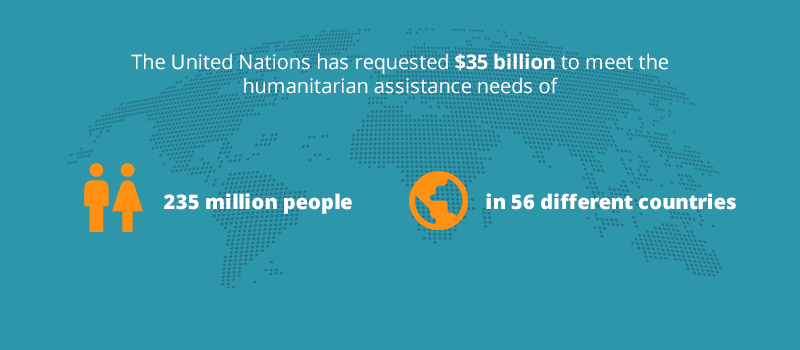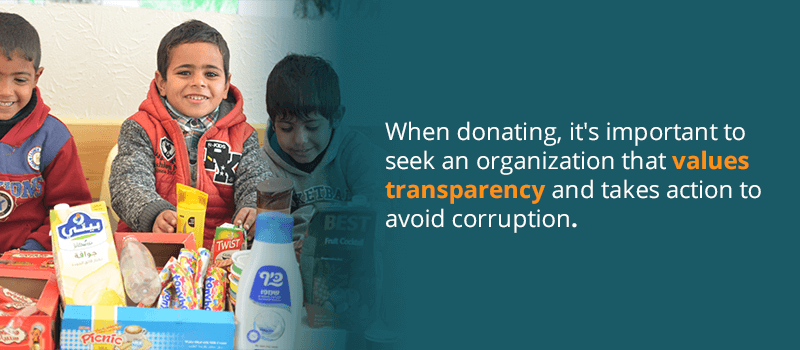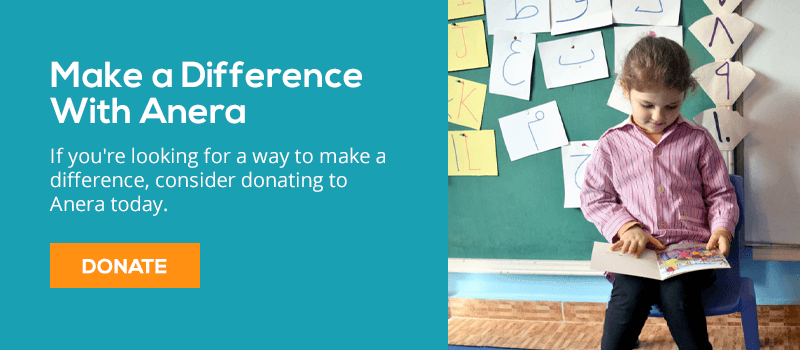4 Reasons to Care About Humanitarian Funding Needs in 2021
Posted in: About Anera, News, Society & culture
Humanitarian funding provides vulnerable groups the resources they need to restore a happy, healthy state of life. Around the world, people need a helping hand following natural disasters and political unrest. The aid they receive thanks to humanitarian funding serves many vital purposes. Humanitarian aid can save lives in times of crisis, and it can restore a sense of purpose, community and well-being.
If you’re considering donating to a humanitarian aid fund, you might be wondering what it is, how it works, how it differs from other types of aid and how it benefits those on the receiving end. These are all important questions to ask and concepts to understand.
What Is Humanitarian Aid?
Humanitarian aid is a specific kind of charitable assistance for those who need immediate help. It alleviates suffering resulting from a crisis or disaster. Those who need humanitarian aid include refugees, those who have lost their homes, as well as victims of natural disasters, wars, famines or other catastrophic events. The material or logistic aid can include essential items such as:
- Food
- Water
- Medical supplies
- Temporary housing
- Labor and support
All non-governmental relief efforts rely on donation-based funding. Humanitarian aid differs from other types of international funding efforts, as it has no connection with any political stance. Instead, it is intended to serve those who need it most.
The Principles of Humanitarian Aid: How Does Humanitarian Aid Work?
Not all charitable donations are humanitarian in nature. Assistance has to serve four basic principles and meet certain characteristics to qualify as humanitarian aid. These principles ensure the aid provided helps those in need without contributing to local conflict or further marginalizing vulnerable groups. The four principles of humanitarian aid are as follows:
1. Humanity
First, humanitarian aid should address human suffering. It should serve to protect life, health and dignity for those in need. It should help establish and maintain respect for human beings. Human suffering can take many forms, so humanitarian aid can include a wide range of supplies and actions, as long as it helps restore well-being. As an example, supplies given to support a military body do not alleviate human suffering and are not a form of humanitarian aid.
2. Impartiality
Humanitarian aid should be impartial, always based on need alone. Priority should coincide with urgency, rather than any other factors. Those who provide and administer humanitarian assistance should make no distinction based on nationality, race, religious belief, age, gender, socioeconomic class or political alignment.
3. Neutrality
Those who supply humanitarian aid should take special care not to take sides in conflicts or play a role in controversies, whether they are of political, racial, religious or ideological nature. For instance, aid would not be neutral if given exclusively to partisans of a militia group while ignoring comparable need in a population of civilians in an opposing side of the conflict. This would not classify as humanitarian aid. Failing to meet the principles of impartiality and neutrality in assistance can have complex, long-term consequences. Determining when and where to provide aid can become complicated in some circumstances.
4. Independence
Similarly, those who administer humanitarian aid should be independent of any political, economic or military objectives in the region. The absence of independence could create a significant conflict of interest and impact the purposes the aid serves. That’s why a state of independence is important for any group offering humanitarian aid. Aid should always serve those who need it first, not serve those in a specific group first.
Four Reasons to Care About Humanitarian Funding Needs in 2021
Many reasons might compel you to care about humanitarian assistance needs, but those reasons are not always obvious at a glance. Since many donors live across an ocean from the issues they’re helping alleviate, the effects can be challenging to see. The benefits of humanitarian aid are significant. These are some of the reasons why humanitarian aid matters:
1. Funding Makes A Real Difference
Above all else, humanitarian aid benefits those in need in multifaceted ways. Funding allows organizations to provide lifesaving supplies like medicine, food, water and health care. It provides the emergency, short-term assistance necessary to keep people alive and healthy during or following a crisis. It also contributes to long-term change in areas like education, agricultural development and bolstering community spirit.
Humanitarian aid donations make a real difference. At its most basic, such support helps to preserve human life. Donations also help crisis victims access resources for long-lasting physical and mental health, as well as personal growth. In many ways, this assistance benefits more than its immediate receivers. Desperate situations lead people to take desperate actions. By lifting people out of desperate situations, humanitarian aid produces a safer global society.
2. Funding Provides the Resources to Help Kickstart Plans
Once a humanitarian response plan is developed, funding provides the resources required to set it into motion. A comprehensive plan can lead to more effective and efficient recovery efforts, but it will only work if funding is adequate every step of the way. Access to enough funding allows plans to move forward and progress to take shape.
Humanitarian aid plans should begin with necessary emergency relief and later shift focus to creating a reliable, hopeful future. After aid meets all emergency needs, it should provide access to basic social services such as education and health care. Finally, providing work opportunities, permanent housing and other long-term support is an important step. This progression is not always linear — emergency situations can arise at any time in a vulnerable community.
3. There Is an Ever-Growing Need for Humanitarian Aid
The current need for humanitarian aid is unprecedented. Environmental issues and climate change have led to less predictable weather events, and many communities are vulnerable to the effects of pollution. In addition, political conflicts in Africa, East Asia and the Middle East have resulted in large numbers of refugees.
The United Nations has requested $35 billion to meet the humanitarian assistance needs of 235 million people in 56 different countries this year. This is a 40 percent increase from the amount requested in 2020, due in part to the lasting effects of COVID-19. Other factors include climate shocks, political conflicts and violence against specific groups. In 2021, emergency relief is a worldwide priority and every bit of humanitarian aid can help. The need for assistance and funding continues to grow each year.
Among those who continue to require aid are refugees in Palestine, Lebanon and Jordan. The Arab-Israel war in 1967 left thousands of Palestinian refugees without homes and resources. The issue is ongoing and each year the refugees need both emergency relief aid and long-term development aid. Humanitarian funding provides resources for health, education and economic development.


4. We Have a Shared Responsibility to Help Others
Helping those in need is the right thing to do. People everywhere share the responsibility to lift up those who are struggling. Supporting those who have been devastated — whether by conflict, disaster or other factors — is a moral obligation. Humanitarian aid helps create a world where no one is left behind and everyone has access to the resources they need. In turn, worldwide humanitarian care creates a safer, stronger and more productive international society.
The world is interconnected and a crisis in one area often crosses borders, becoming a broader issue elsewhere. In this way, helping others also prevents the spread of suffering to benefit both the donor and the receiver. Many feel that with increased wealth comes increased responsibility, which would mean vastly wealthy nations like the United States have a social, moral responsibility to give what they can.
Humanitarian Aid Misconceptions
Widespread misconceptions often influence the way people think about humanitarian aid. These misunderstandings can be detrimental, so it’s important to learn the truth. Here are some of the most common misconceptions about what humanitarian aid is and how it works:
Myth: All Aid Organizations Are the Same
Many people think various humanitarian organizations are interchangeable, serving the same purposes. While their objectives often overlap, different organizations have unique specialties. No single organization can fulfill every need everywhere aid is necessary. Instead, one group may focus on providing medical care, while another focuses on shelter reconstruction. It’s important for different groups to work together rather than competing against each other.
Myth: All Staff and Volunteers Are Expatriates
One common misconception is that expatriates perform all humanitarian work, traveling overseas in times of crisis. In reality, many relief organizations employ local people to administer aid. Local people are experts in their culture, language and national conditions. In addition, their ongoing presence leads to longer-lasting, sustainable change. If only foreigners administered support, their help would leave along with them, making communities vulnerable.
Myth: Effective Humanitarian Aid Should Solve the Problems
Worldwide crises are complicated, especially those interwoven with political, religious and racial tensions. Even the most effective humanitarian organizations will not solve these underlying problems on their own. In many cases, broader political action is necessary to address the root cause of a humanitarian crisis. Catastrophes, however, can be unavoidable, such as natural disasters.
Humanitarian aid serves a vital purpose in the wake of such events. It saves lives by making supplies and professional care available. It also helps build resilience and hope. Effective aid helps construct a foundation for sustainable change, so groups are stronger in the face of ongoing issues.
Myth: Aid Organizations Are Corrupt
Corruption does exist within certain aid organizations. Sometimes, emergencies lead to weakened governments, increasing susceptibility to fraud. For this reason, some are wary about contributing to humanitarian organizations. While the concern is well-founded, you can take steps to make sure your donations serve those in need.
When donating, it’s important to seek an organization that values transparency and takes action to avoid corruption. For instance, look for a list of past financial audits performed by independent agencies. Available financial records suggest an organization’s willingness to be open and honest. It’s also a good idea to look for records of the work a humanitarian group has done over the years. Research humanitarian organizations by reading some of the press coverage they have received. Most legitimate organizations are excited to share what they have accomplished. As long as you know what to look for, you can find reputable humanitarian relief groups.


How You Can Help
Thankfully, there are many ways to help through organizations like Anera. You can choose to give however you feel is most beneficial, in an amount with which you feel comfortable. Here are some of the ways you can help Palestinian refugees and other vulnerable communities in Lebanon, Palestine and Jordan:
- Giving monthly: One of the most impactful actions you can take is committing to a monthly donation. When you give each month, no matter how much you give, you support long-term efforts to make life better for refugee families.
- Giving a planned gift: Setting up a planned gift is a meaningful way to help, offering you the chance to join your life’s legacy with Anera’s humanitarian work. Many donors have decided to designate a set amount or percentage of their estate for this cause.
- Giving in honor of a loved one: You might also choose to give in honor of someone you love, spreading hope and positivity in their name. With your donation, you can include an e-card to notify them of your gesture. This is a great way to celebrate someone while impacting meaningful change.
- Giving in memory of a loved one: Donating to a worthy cause is an ideal way to recognize someone’s legacy and spread good will in their name. You can honor a loved one’s memory with your donation.
- Giving a Zakat donation: Zakat donations help maintain a steady supply of most fundamental necessities, such as food packages, medicines, medical supplies and hygiene kits. When you give to this fund, you’ll help save refugee lives every day.
- Joining Anera’s leadership circle: For those who have the means, joining Anera’s leadership circle is the most powerful way to make a difference. The various tiers of the circle include special membership benefits, such as webinars with staff, dinners, receptions and access to exclusive photos and other resources. The highest leadership circle donors are able to see their support in action with a visit to the region. They also earn the chance to meet Anera’s chief executive officer in person.
Anera builds on the resilience that lives in the hundreds of vulnerable communities we reach. Because we believe that each person, no matter their circumstances, embodies promise. And that people with hope can shape the life of their families, their neighborhoods, and their region. They need your help to grow stronger and more resilient. When you give to our humanitarian aid fund, you save and improve lives.
Anera’s Humanitarian Pledge
Feeding a hungry child is an act of compassion
— not a political statement.
Providing safe places for young people to
learn and grow helps build community
— not division.
Easing refugees’ suffering, caused by war and poverty,
should inspire our shared responsibility
— not controversy.
Giving disadvantaged families access to
reliable livelihoods creates peace
— not conflict.
Ensuring that our most vulnerable communities
have access to clean water is a right
— not a privilege.
As a human being,
standing up for those who need help
is not a difficult decision.


Humanitarian aid is essential. And the need for it grows each year. Giving to a humanitarian aid fund like Anera’s serves many vital purposes. Emergency relief supplies save lives, keeping people safe and well. Other efforts help rebuild communities and pave the way toward a brighter future. Feel free to contact us with any questions about who we are or what we do. If you’re looking for a way to make a difference, consider donating to Anera today.
OUR BLOG
Related
In Gaza, systematic bombardment of civilian housing and infrastructure has created a crisis of shelter that is endangering over a million.
The undersigned members of the Association of International Development Agencies (AIDA) urgently call upon the international community to intervene and halt settler attacks targeting Palestinian civilians and protect Palestinian communities near illegal settlements. The International NGO Community urges international actors…
